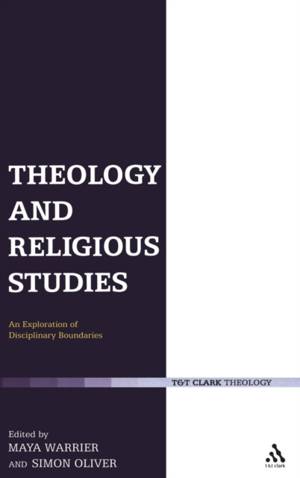
- Retrait gratuit dans votre magasin Club
- 7.000.000 titres dans notre catalogue
- Payer en toute sécurité
- Toujours un magasin près de chez vous
- Retrait gratuit dans votre magasin Club
- 7.000.0000 titres dans notre catalogue
- Payer en toute sécurité
- Toujours un magasin près de chez vous
Theology and Religious Studies
An Exploration of Disciplinary Boundaries
373,45 €
+ 746 points
Description
Theology and Religious Studies seeks to explore the relationship between the disciplines of Religious Studies and Theology. In particular, it aims to examine whether the two disciplines are strange bedfellows sharing little in common but bedding together out of sheer habit, or whether there is something that the two share in an organic sense, which sustains the link between them.
These questions have important implications not just for how the respective disciplines define themselves and their boundaries, but also for their place in the secular context of higher education in modern universities. The question of how the two are related is one that concerns all scholars of religion, since it has important implications for approach and method in the study of religions. Particularly relevant are questions to do with subjectivity, objectivity, and reflexivity in the study of religion; 'insider' and 'outsider' approaches; 'scientific' and 'theological' methodologies; and 'public'/'private' dichotomies in defining the 'secular' and the 'religious'.
This volume is based on a seminar series conducted over 2005-06 in the Department of Theology and Religious Studies, at the University of Wales, Lampeter, UK. It brings together papers presented by leading scholars of Theology and Religious Studies on various aspects of their respective disciplines. These include origins; history; founding premises; orientations; methodology; engagement with feminist and post-colonial critiques; and shifts in theoretical paradigms over time. The intended result is the generation of dialogue between the two disciplines, and a self-reflexive examination of what each is about. There is very little available literature attempting such a dialogue between Theology and Religious Studies, and this book will fill a crucial gap in this area.
These questions have important implications not just for how the respective disciplines define themselves and their boundaries, but also for their place in the secular context of higher education in modern universities. The question of how the two are related is one that concerns all scholars of religion, since it has important implications for approach and method in the study of religions. Particularly relevant are questions to do with subjectivity, objectivity, and reflexivity in the study of religion; 'insider' and 'outsider' approaches; 'scientific' and 'theological' methodologies; and 'public'/'private' dichotomies in defining the 'secular' and the 'religious'.
This volume is based on a seminar series conducted over 2005-06 in the Department of Theology and Religious Studies, at the University of Wales, Lampeter, UK. It brings together papers presented by leading scholars of Theology and Religious Studies on various aspects of their respective disciplines. These include origins; history; founding premises; orientations; methodology; engagement with feminist and post-colonial critiques; and shifts in theoretical paradigms over time. The intended result is the generation of dialogue between the two disciplines, and a self-reflexive examination of what each is about. There is very little available literature attempting such a dialogue between Theology and Religious Studies, and this book will fill a crucial gap in this area.
Spécifications
Parties prenantes
- Editeur:
Contenu
- Nombre de pages :
- 224
- Langue:
- Anglais
- Collection :
Caractéristiques
- EAN:
- 9780567032362
- Date de parution :
- 01-07-08
- Format:
- Livre relié
- Format numérique:
- Genaaid
- Dimensions :
- 160 mm x 234 mm
- Poids :
- 453 g

Les avis
Nous publions uniquement les avis qui respectent les conditions requises. Consultez nos conditions pour les avis.





